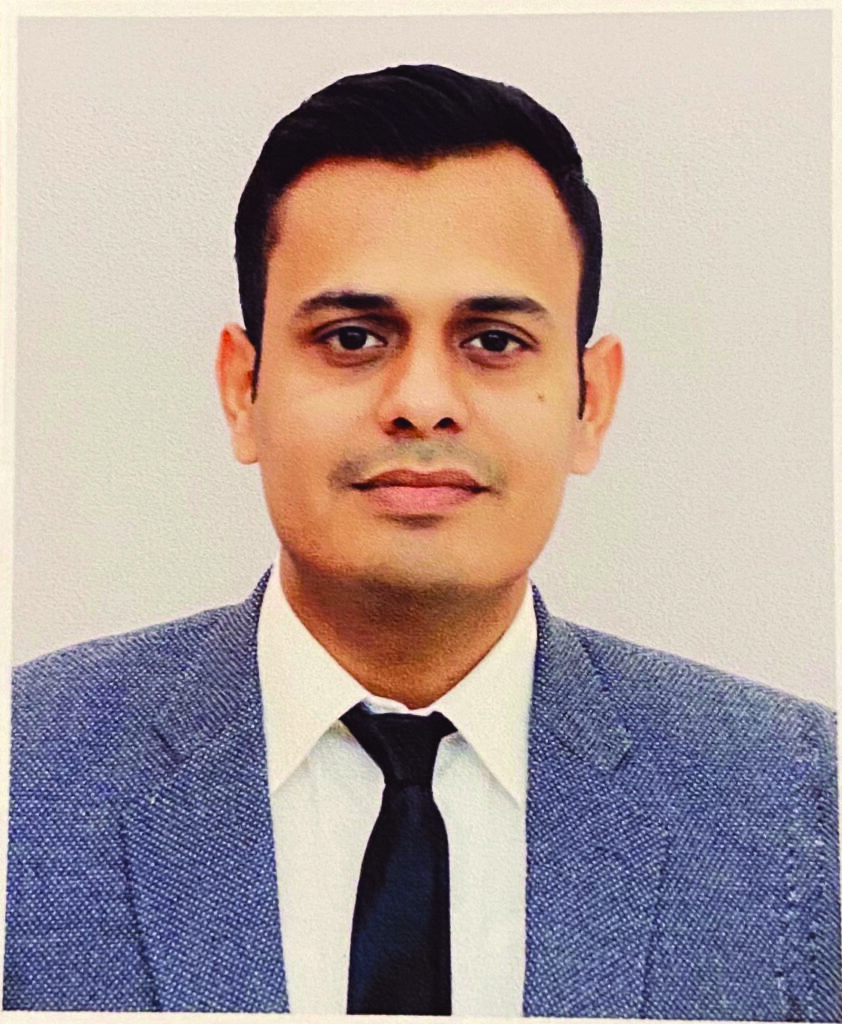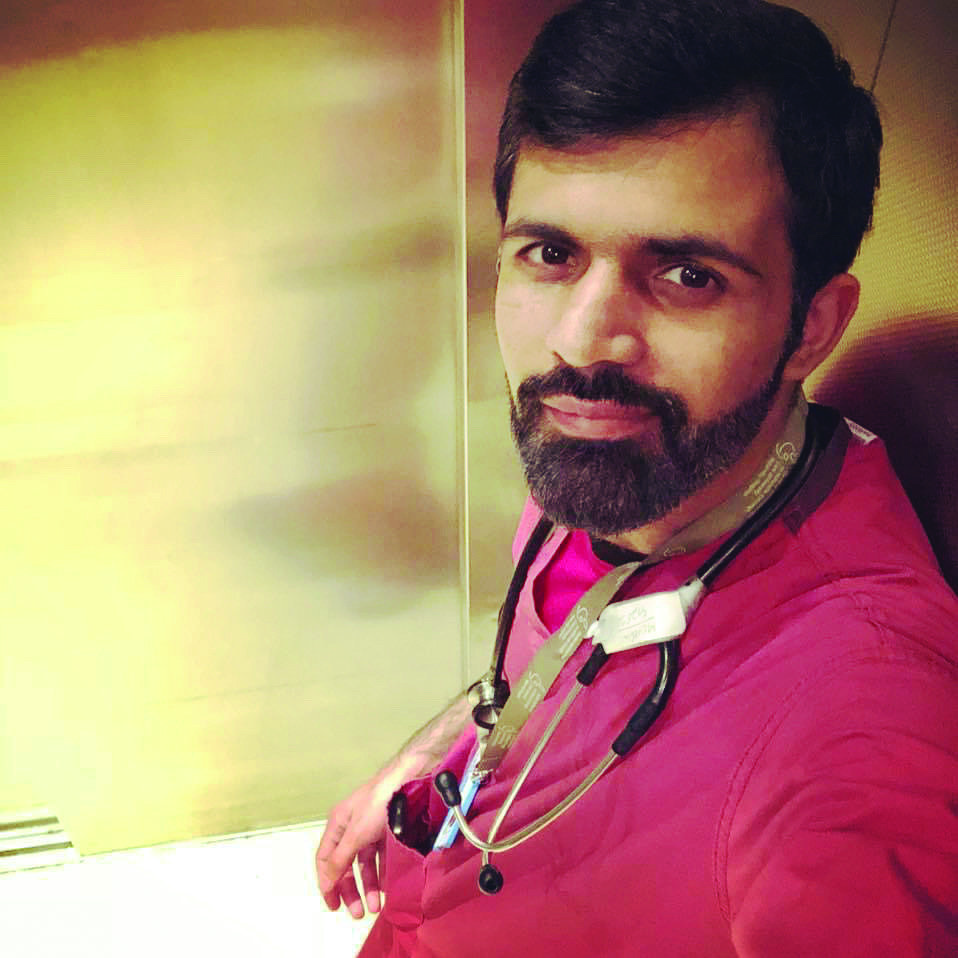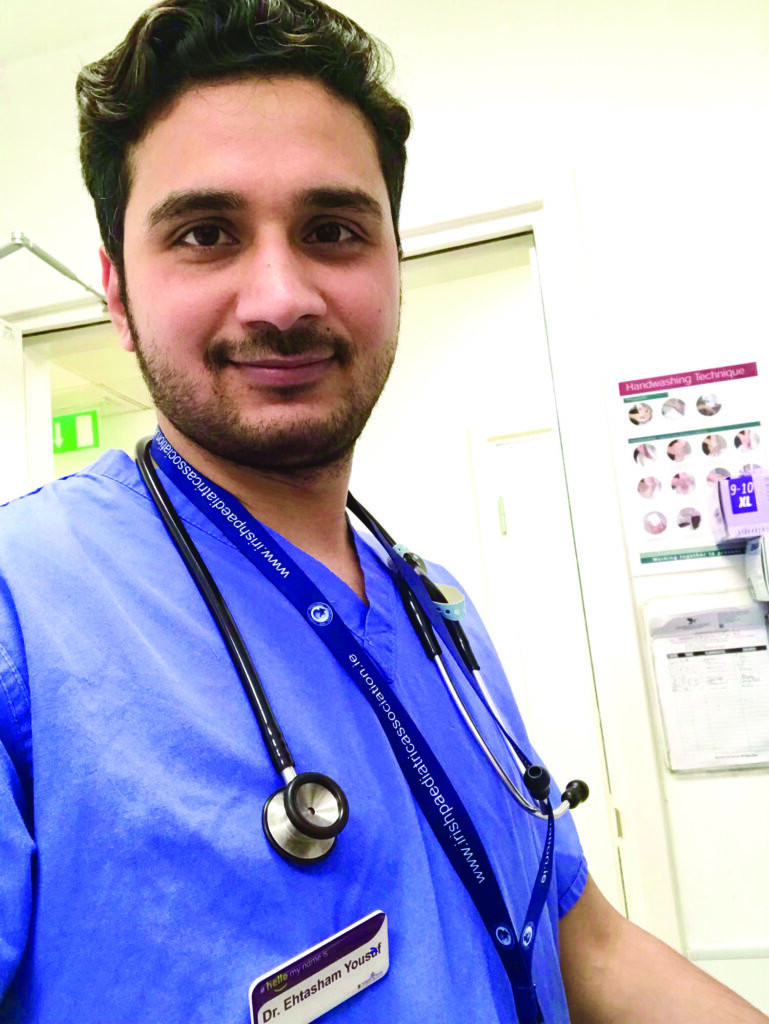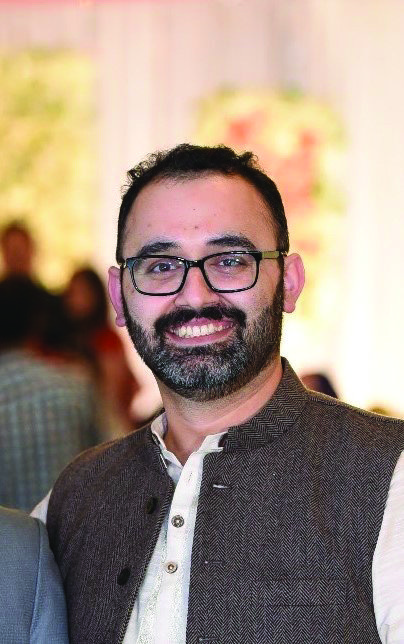Non-EU doctors are becoming increasingly mobilised about longstanding barriers to training access in Ireland. Catherine Reilly reports
“We are in a state of nowhere.”
Dr Haroon Usman, a Dublin-based registrar in paediatric metabolic medicine, articulates a bleak reality for many non-EU doctors in Ireland.
Hundreds of these doctors cannot access training programmes. This is despite the group being a crucial component of medical manpower, particularly in the current pandemic, and often contributing to the education of trainees.
“We are doing teaching on a daily basis to be honest,” confirms Dr Mohsin Kamal, a registrar in infectious diseases at a Dublin children’s hospital.
Drs Kamal and Usman, both originally from Pakistan, hold Membership of the Royal College of Paediatrics and Child Health (UK). They told the Medical Independent (MI) that numerous colleagues with experience in service posts and memberships have left Ireland, often for the UK, where they entered specialty training. This has been ongoing for years.
While several doctors who spoke to MI are working in paediatric medicine, the barriers apply in all the medical and surgical specialties.
EU law
A key issue is the application of EU community preference during the recruitment process for postgraduate training programmes, without further capacity or established alternative pathways for Ireland-based non-EU doctors.
Another barrier is the unusual requirement under the Medical Practitioners Act 2007 to hold an internship deemed technically equivalent to the Irish version in order to obtain trainee registration. An amendment to remove this stipulation is included in a long-awaited Bill that is expected to recommence its passage through the Seanad “shortly”, according to the Department of Health.
But this situation is nothing new. A 2014 RCSI paper on the experiences of non-EU doctors cited a newspaper article from 2006, which noted a sense of despair among such doctors who felt they were “being treated like disposable paper cups”.
Fast-forward to 2020 and disillusionment is evident, with affected doctors feeling that any avenues to progress are closed-off.
Until recently, for example, the RCPI provided a narrow route to progression that offered some hope to doctors in medical specialties. MI has seen a letter from Faculty specialty directors to a non-training scheme doctor in late 2017, whereby the Faculty deemed the documentation received as sufficient to grant the doctor an exemption from completing basic specialist training (BST) in order to apply for higher specialist training (HST).
The exemption was conditional on the doctor completing all BST mandatory courses as per the curriculum by the following July.
“We cannot issue a certificate of completion for equivalence, however we are happy to attest that your experience and training completed is recognised in this case as equivalent to BST for the purposes of applying to HST. If you are applying to higher specialist training, you may use this letter to support your application,” stated the letter.
“But now that has stopped,” Dr Kamal told MI. “That was the only route where I thought four years ago I can achieve and apply for HST. But after four years in Ireland, after completing my membership, I found out they have stopped that as well.”
MI asked the RCPI why this was stopped but it did not issue a comment. This newspaper also sought comment from the Medical Council as to whether it had a position on such exemptions and a response was awaited at press time.
“There should be some routes for us,” said Dr Kamal. “I absolutely feel like we are being not treated nicely here. We are just doing the service job in the system and we have no progress or any development….
“On the other hand, if you see the training doctors, they are being offered the study days, and they are being offered the research, and logbooks, and they have their mentors. The non-training doctors don’t have any of these things.
“We have to do everything on our own; like the courses, I am trying to get into one of the courses, and it has been nearly two years and there is no slot for me to get into that course, that is how we are being treated here.”
During the summer, Dr Kamal and colleagues met with the RCPI to discuss these matters and they await an update from the College. Reference was made at the meeting to EU law requiring the postgraduate colleges to give preference to Irish/EU candidates.
The non-EU doctors are advocating for a streamlined and well-defined parallel pathway to BST and granting of BST exemption to candidates meeting specified criteria. They also want non-training doctors to be issued with a logbook and have a system for consultant/supervisor feedback, and suggest as an option a quota of training places equally open to non-EU candidates based on merit. These reforms would also enhance standards and safety in Irish hospitals, they say.
Dr Usman said “we totally respect” that most training places would be for Irish and EU national candidates.
An RCPI spokesperson told MI it was aware of issues regarding access to specialist training for non-EU doctors “and are working with a wide range of stakeholders, including HSE National Doctor Training and Planning (NDTP) to expand educational and training opportunities for those doctors who are not currently in training schemes”.
The RCPI said it recognises the “enormous contribution” made by non-EU doctors in Irish hospitals “especially at this challenging time”.
“As the largest postgraduate medical training body, RCPI is working with a range of stakeholders, including the Forum for Postgraduate Medical Training Bodies and Medical Council, to address the challenges faced by those doctors who are not in training schemes. This issue was discussed at a recent [RCPI]Council meeting. The College has also held meetings with doctors who are advocating for changes on behalf of this group.
“A number of amendments to the Medical Practitioners Act that impact on access to training for some doctors are awaiting enactment. RCPI has lobbied for the enactment of these amendments many times and most recently (June 2020) RCPI President, Prof Mary Horgan, wrote to the Minister for Health, Stephen Donnelly, to highlight the urgency of progressing these amendments.”
Dr Justin Brophy, Chair of the Forum of Irish Postgraduate Medical Training Bodies, told MI the training bodies are bound by EU law even where they find it disagreeable.
“It is a very big problematic barrier [for non-EU doctors], we don’t agree with it, we don’t like it, we think it’s discriminatory…there should at least be exceptional pathways available to people, to priority workers, or special arrangements or rules made. However, our capacity to lobby [on the matter] or have that reviewed is very, very limited.”
Dr Brophy pointed out that the Forum had strongly lobbied for the amendment to remove the internship equivalency requirement.
But he acknowledged that more needs to be done to provide training opportunities and “some kind of employment security or pathways that are not insecure”.

While all the postgraduate bodies are bound by EU law, the College of Anaesthesiologists has been proactive in highlighting another potential route to specialist registration for doctors working in the specialty who are not on the training programme (see panel below).
Ongoing recruitment
Ireland is extremely reliant on doctors from overseas. In 2018, some 42.8 per cent of doctors on the medical register were international medical graduates, up from 34.9 per cent in 2012. According to a HSE report on NCHD posts in 2018/19, non-trainee numbers had jumped by 63 per cent since 2011 (1,524 to 2,482) while trainees (including interns) increased by 18 per cent (3,412 to 4,018). The requirement for European Working Time Directive compliance is a notable factor in the rise in non-training numbers.
NDTP wants to convert non-training posts, largely occupied by non-EU doctors, into consultant and training posts. But it is hamstrung by recruitment and retention difficulties and lack of State funding for postgraduate medical education.

“The goal of the HSE is to develop a sustainable medical workforce to staff the health service with the appropriate number of NCHDs in training and consultants to deliver the service,” a spokesperson told MI.
“The HSE has highlighted to the Department the requirement to retain graduates from the Irish medical schools and reduce the reliance of the health service on doctors not in training. The established International Medical Graduate Training Programme is one structured route for non-EU doctors to gain access to clinical experience and training in Ireland and further enables the HSE to reduce the number of non-training scheme doctors in the system.”
The voluntary World Health Organisation (WHO) Global Code of Practice on the International Recruitment of Health Personnel recommends that developed countries limit their ‘poaching’ of healthcare professionals from developing countries.
The code also states that member states should take measures to ensure recruited migrant healthcare professionals “enjoy opportunities and incentives to strengthen their professional education, qualifications and career progression, on the basis of equal treatment with the domestically trained health workforce subject to applicable laws”.
Ireland’s approach is “a complete contradiction of the WHO recommendation”, according to Dr Usman. “WHO recommends that members of WHO should observe fair recruitment practices and ensure equality of treatment of migrant and domestically trained healthcare personnel.”
In other countries such as the UK (even before its departure from EU) “candidates that are deserving have access to training programmes, but in Ireland every single pathway is blocked”.
“Friends applied for training in the UK and straight away they were given ST3, ST4, and they have moved to UK already, last year and the year before, and there is a huge influx of doctors going from Ireland to the UK.”
Dr Usman also expressed concern that the HSE was letting experienced doctors leave and then recruiting doctors unfamiliar with the Irish system. “Our HSE is bleeding and we are losing our well-trained and committed doctors who have waited patiently for three years, four years, even six years in Ireland. But finally they have to pack their bags, they have to convince their families ‘let’s go somewhere where our hard work gets recognised’.”
“It is not that we are not learning, we are learning but we are heading nowhere,” he added. “I don’t want to be a registrar for the next ten or twenty years in my life.”
A doctor from India, who preferred not to be named, told MI she knew “plenty” of non-EU doctors who had left Ireland for the UK and attained training positions. This doctor, who works in the west of Ireland, said she was nearly finished UK membership exams.
“I might be flying to the UK as well, I don’t know. But I love Ireland. Everything about Ireland, the scenery, the people, the culture… I love Ireland and don’t want to move, but yet, here we are. Maybe I will be making a move. Everyone wants in their life to have career progression, and if I am not getting career progression there is no point for me to stay here.”
She said the coronavirus crisis illustrated that “life is short” and this has been particularly impressed on the medical profession in recent months.
Covid-19
The Covid-19 pandemic has cast a spotlight on social inequalities in many ways, including the predicament of non-EU doctors. The tragic death from Covid-19 of Dr Syed Waqqar Ali Shah, a locum doctor who worked at a number of Dublin hospitals for many years, moved a fellow Pakistani doctor to write a letter to MI that drew on important themes, including fairness in career progression.
In an affecting piece of writing, which garnered a huge reaction from medical readers and wider society, surgical registrar Dr Naveed Abbas referred to the experiences of non-EU doctors who cannot access training.
“There is no effort from either the RCSI, RCPI or any other body to train or develop these immigrant professionals. They are instead relied upon to automatically adapt and train themselves and fill these second-tier jobs. And in these jobs, they flit from one orphaned hospital to another, an endless loop, a vicious cycle. Dr Waqqar was in the same system for 20 years. It’s legitimate to ask why he never progressed to a consultant position. Isn’t 20 years enough time to train someone to that level?” he wrote.
Speaking to MI, Dr Abbas said there were “two different tiers of doctors” in Ireland. Dr Abbas said this dichotomy of predominantly Irish doctors in training positions, and non-EU doctors in service posts, created a damaging dynamic in the workplace setting.
“For the trainee doctors it is almost a way of saying ‘you are better than others’… That alone, if you look at that context, is as racist or biased a concept as it gets.”
There is also a “very clear pay difference” between the two groups and in some cases leads to long-lasting implications. One of these was many doctors turning to locum work. “Locum doctors used to get paid a lot more until the HSE decided – again completely arbitrarily – that they should be paid a good deal less and with a stroke of someone’s pen reduced the hourly rate by 20-25 per cent about three-four years ago. It was a measure to encourage more of these locum doctors to take up regular HSE jobs.
“But as always they failed to actually address the real reasons behind the disillusionment of doctors in avoiding regular HSE jobs. Instead of coercion, a very simple autopsy would have pointed out the glaringly obvious problems within the HSE itself which was where the correction needed to take place.”
There are other examples of how migrant, non-training doctors can be seen and treated as a dependable but expendable cohort. An Irish doctor recalled for MI a “disgraceful” situation where non-training SHO colleagues were offered posts to stay on in a hospital following changeover. However, the hospital then got an offer of more trainees and the non-training doctors, who were non-EU nationals, were told they had no post about one month before changeover, when other standalone posts had been filled. This caused considerable upheaval in the doctors’ lives, especially where they had children.
Promises?
Some non-EU doctors who spoke to MI said there was ambiguity about training opportunities in Ireland prior to arrival, although they had an impression training was accessible even if by circuitous routes. Others have reported that HSE recruitment drives referred to future training access.
Dr Abbas was one of almost 300 doctors recruited by the HSE from Pakistan and India in a recruitment drive in 2011 amid a dire shortage of medical personnel in Ireland.

“They told us once you get there, you get into the system, then you get trained and go on to be a consultant, and they sold us some very nice stories about how people progress… When we came here, it was all great for us, because for a lot of us the reasons for coming were not exclusively, but always additionally, finance. The pay for an SHO here is better than that of a public service consultant in Pakistan at times because of the devaluation of the Pakistani rupee….”
It can take some time for migrant doctors to acclimatise and get their bearings, he added.
“First or second year, you are a bit smitten so you don’t know exactly what is going on, but once you actually get into the health service, then very quickly you learn from the other Pakistanis; many of whom have kind of given up on going forward …It was only when I stayed in the midlands for a couple of years that I realised, ‘this is a dead end’.”
Dr Abbas emphasised “we never searched for Ireland, they searched for us; they came and asked for us to come over”. This is a question of respect, he said.

Paediatrics registrar Dr Ehtasham Yousaf has been in Ireland for over five years. He has completed UK membership exams and is strongly considering leaving due to lack of training access. Dr Yousaf, who wants to specialise in neonatology, arrived at the very beginning of his career, having graduated in Pakistan.
“I applied through a recruitment agency, had a Skype interview, there was a shortage of doctors – there still is, not as much as 2015 – so I got a job. Nobody promised me anything, but I had a lot of promises in my mind for myself that I am going to progress in my career, I am going to make a good living, I am going to have training in one of the best standard healthcare systems….” But he gradually began to realise “you are just working here, filling the gaps”.
He started keeping a logbook and has tried to rotate by his own accord. “It was very difficult for me doing it on my own, not getting any help, not getting any mentor. You will not get any extra study days, you will not be encouraged or told about any additional courses… nobody will ask you to do research work, everything you do will be by yourself and you will have to push yourself.”
Dr Yousaf referred to other peculiarities in the system. “I wanted to apply for BST and I was told that because I was over two years in Ireland, my English language exam is not valid anymore, it expired, so I have to do it again. That was another hindrance.
“I am based in an English-based healthcare system for the past few years and when I came here, I came on the basis of a valid English language test, so why do I need to do it again, if I am working in the suitable system and my English can be approved by my consultant?”
He is one of a number of doctors who have raised awareness of training access by way of online petition. The last edition of MI also highlighted a survey on training access by a group called ‘Train Us For Ireland’, which found more than half of non-EU doctors would not recommend to colleagues to work for the HSE.
Non-EU doctors are becoming more mobilised on the issue and are discussing the matter at length on WhatsApp groups. In recent months, Dr Abbas advocated to the IMO that it should take a much keener interest in the difficulties facing non-EU doctors, leading to the formation of an international doctors’ group within the union.
“[The first] meeting was quite good; it conveyed some seriousness from the IMO to take this on,” he remarked. Dr Abbas said he is “not a political person”, but realised he had the ability to articulate the concerns of fellow non-EU doctors, as he did in his letter to MI.
“There is a group here that has been underrepresented wholly for too long, and I really was forced into doing this. I hate being in the limelight but there is no other way out and I believed it was necessary to articulate the frustrations of a workforce that makes up half the number of doctors in the country.”
Dr Abbas noted the comment of a younger colleague at the IMO meeting who said “we have been told clearly by many people, that if you stick your neck out, it is likely to result in blowback, nobody is going to be at your back and you are likely to end up on the chopping board”.
Department comment
The Department of Health stated it has engaged “extensively” with HSE NDTP in relation to improving the position of doctors in non-training NCHD posts. “[The Department] strongly supports the doctors having training opportunities and appropriate supervision…. The Minister, Department and the HSE are committed to continuing to improving the position of the doctors,” said a spokesperson.
According to the HSE, “all NCHDs hold the same contract of employment and terms and conditions, there is no distinction regarding international graduates. They have identical entitlements to annual leave, study/educational leave, etc.”
The HSE said it provides for a number of support schemes to strengthen the professional education, qualifications and career progress of all NCHDs. These schemes are the training support scheme; continuous professional development support scheme; and clinical courses examination refund scheme.
College of Anaesthesiologists promotes alternative pathway to specialist status
A study in 2016 found that non-EU doctors in Ireland working in anaesthesiology were “significantly more likely to experience career progression than those in other specialities”.
Non-EU doctors who specialised in anaesthesiology were nearly 15 times more likely to experience career progression than those in other specialties, according to the RCSI/Trinity College Dublin study titled ‘Predictors of career progression and obstacles and opportunities for non-EU hospital doctors to undertake postgraduate training in Ireland’.
According to College of Anaesthesiologists CEO Mr Martin McCormack, the College is obliged to give preference for training places to Irish and EU nationals under EU law. However, he provided further insight as to why non-EU doctors are enjoying greater career progression in anaesthesiology by way of another pathway.
There are approximately 350 doctors in Ireland working in anaesthesiology, intensive care and pain medicine who are not on the training programmes. They are not an homogenous group, noted Mr McCormack, and not all have the same intention of becoming consultants in Ireland or accessing training.
“Most are excellent colleagues, a percentage of whom will want to follow a structured pathway to become a consultant and entry onto the specialist division of the register here in Ireland.”
Aside from completing training in Ireland and acquiring a certificate of satisfactory completion of specialist training, Mr McCormack said there is another route to registration as a specialist with the Medical Council under section 47 of the Medical Practitioners Act 2007. He said this is a route actively promoted by the College.
Part of this process involves the doctors working at hospitals accredited by the College for training, with appropriately qualified consultants and volumes of activity.
He said the College makes concerted efforts to let doctors know which hospitals are accredited for these purposes and for how long. Mr McCormack said the College has also broadened access to courses that are mandatory for trainees, so that non-training scheme doctors in anaesthesiology can attend.
“So when someone comes, be it through the training programme or parallel pathway, that they will all have an e-portfolio, they will all have the volumes of practice, they will have attended the same mandatory courses and then there will be aspects like audit, research [etc].”
Under the section 47 process, the College assesses the doctor’s credentials and makes a recommendation to the Medical Council. “We basically take the template for our training programme and try to apply that in terms of assessment of those doctors. And we are proactive in doing that, we inform people about it….”
Mr McCormack said this process is transparent. “You either have the volume of activity, you either have the modules signed off, have the mandatory courses, yes or no.”
He said anaesthesiology and intensive care medicine is very much a team-based and supervised practice, where doctors are working closely with colleagues in departments. The College has recently elected Consultant Anaesthesiologist Dr Ehtesham Khan as Vice President and part of his role will be engagement with the approximately 350 doctors not on a training programme in order to strengthen their links with the College and find out more about their needs.
Citizenship applications from Pakistani doctors ‘treated the same’ – Department of Justice
Obtaining Irish citizenship may be a means for long-standing resident non-EU doctors to access training schemes, due to the official preference for Irish/EU candidates. But the citizenship application process is also bedevilled by red tape and some non-EU doctors perceive that their applications take longer than those of other candidates, a point disputed by the Department of Justice and Equality.
“Citizenship applications from doctors from Pakistan are treated the same as other citizenship applications,” said a Department spokesperson. “A group of doctors from Pakistan has been in touch with the Department about their applications and a senior official from the Department has offered to meet with them to discuss their concerns.”
Two “major factors” have led to “significantly increased delays” in citizenship by naturalisation applications, according to the Department. One factor has been legal uncertainty arising from a court outcome in July 2019 in relation to the “continuous” residence requirement in citizenship applications; the second is restrictions attendant to the Covid-19 pandemic resulting in the postponement of scheduled, large-scale citizenship ceremonies (other avenues of delivery are currently being explored)
There are approximately 21,000 citizenship applications being processed. The average processing time for a standard application “can now take up to 12 months”, according to the Department (some doctors who spoke to MI said it was taking longer).
“The Department is actively exploring ways to manage the backlogs that have developed because of these issues outside of the Department’s control and manage a return to the more efficient system that applied up to 2019.”













Leave a Reply
You must be logged in to post a comment.